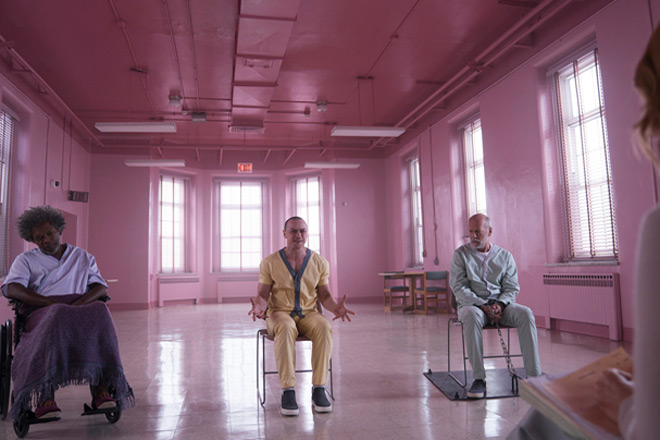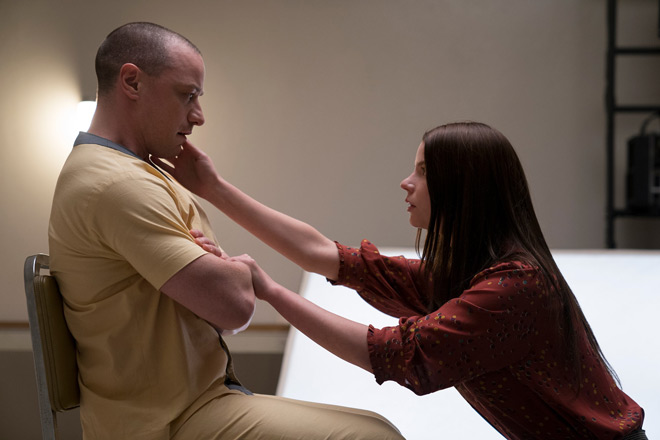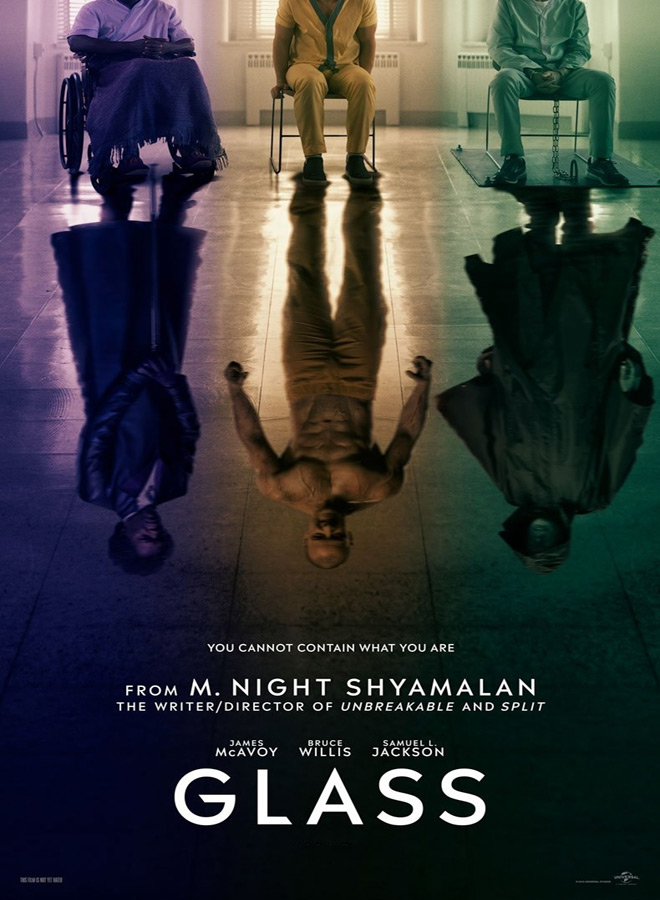M. Night Shyamalan’s newest feature, Glass, is arguably the most anticipated of his career. After the massive success of 1999’s The Sixth Sense nearly 20 years ago, Shyamalan had a string of poorly received films and became a punchline for bad storytelling and falling from grace. That is until 2016’s Split, the second in the Eastrail 177 trilogy, which was his best in years and generally well-received by fans and critics. So, how does Glass stack up against the other films in the trilogy?

Set for release in theaters Friday, January 18th through Universal Pictures, and picking up not long after the events of Split, we are reintroduced to 2000’s Unbreakable protagonist David Dunn (Bruce Willis: Die Hard franchise, Pulp Fiction 1994), who moonlights as a fighter of petty criminals around Philadelphia. With his son Joseph (Spencer Treat Clark: Gladiator 2000, Mystic River 2003) as his tech assistant and radio man, he is pursuing the insane and highly dangerous Kevin Wendell Crumb (James McAvoy: Atonement 2007, X-Men franchise), who escaped at the end of Split and has successfully eluded authorities thanks to his multiple personalities.
Police are on the hunt for both Crumb and Dunn, who they consider a dangerous vigilante. After baiting both with a trap and cornering both, they are captured and taken to a prison for the criminally insane. There, we meet one of the film’s primary antagonists Dr. Ellie Staple (Sarah Paulson: Serenity 2005, Bird Box 2018), a psychologist who specializes in treating patients with delusions of grandeur. She believes Crumb and Dunn both suffer from this mental disorder, and that everything can be explained and treated rationally. Each of them is kept in a specialized cell equipped with their greatest weaknesses to prevent them from escape.
Soon after, we are reintroduced to Unbreakable villain Mr. Glass (Samuel L. Jackson: Pulp Fiction 1994, Snakes on a Plane 2006). He has been imprisoned for 19 years, since the end of Unbreakable, and kept on a steady dosage of sedatives because his greatest weapon is his intelligence. Combined with his brittle bone disease, this renders Glass a shell of a man who can neither walk nor speak. The methods seem overly cruel, and perhaps they are, but viewers will see why such extreme measures are taken against him. Glass manages to sabotage his medication and, using his guile and persuasion prowess, convinces Crumb to follow his lead for the inevitable breakout and subsequent showdown between Dunn and Crumb.

Like Unbreakable, Glass is a slow burn narrative. The majority of the film takes place inside the ward, where Dr. Staple repeatedly tries to convince all three extraordinary men that they are normal people who suffered a mental break and need to be healed. The effects on each are interesting. Even though viewers will dislike Staple simply for being on the opposite side of the law than Dunn, she doesn’t truly show villainous traits outright. Instead we see during the time in the ward how the treatment is designed to slowly wear down resistance, even at the price of physically and mentally breaking them. It’s a subtle and refreshing way to let the audience deduce the intents of a character who is right by law and, for a time, morally as well.
The problems with the film are also in this choice, however. The film spends too much time in the ward and not enough meat in what is a decently-constructed, character-driven story. The series has been described as superhero, but Shyamalan inexplicably treats this as a dubious claim in Glass. Why would most of the film focus on a psychologist trying to convince the extraordinary that they aren’t when the audience knows that they are? We have seen Crumb’s incredible transformations and Dunn’s amazing feats of strength and toughness several times already. It’s like Shyamalan wrote this story for characters who the audience doesn’t know, but at the same time they are his most famous characters.
The ending is anticlimactic and disappointing. It can’t be described without spoilers, but the infamous Shyamalan twist rears its head again, as well as some downright baffling choices with the characters. It’s almost as if Shyamalan is treating his biggest criticisms as endearing traits and caricatures.

Say what you will about Shyamalan’s storytelling ability, but he always has great performances in his films and here is no different. McAvoy is outstanding as Crumb, who is likely going down as Night’s best character. As in Split, it’s one of those performances where it’s hard to imagine anyone else in the role because they found the perfect actor for the role. Likewise, Willis and Jackson play two of their best roles to perfection. Willis is a better actor than a lot of people realize and Dunn is a character where he shows it, and Jackson couldn’t be better as the deeply vindictive and wounded Mr. Glass. It’s a shame Shyamalan’s character creation is so much better than his ability to get his story to the finish line in one piece.
Overall, Glass is about what people both hoped and feared. The performances are great and the narrative is constructed well, but Shyamalan has a special knack for sabotaging himself with choices that bring the story down and do nothing for the audience. Unbreakable has its fans though, and they will probably like what this film provides. However, longtime critics and newcomers will likely find more of the same faults. That is why Cryptic Rock gives Glass 3 out of 5 stars.







No comment